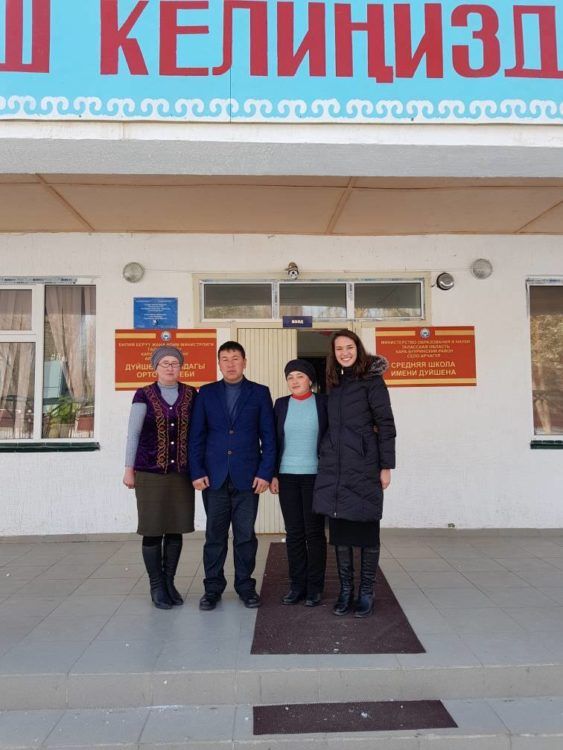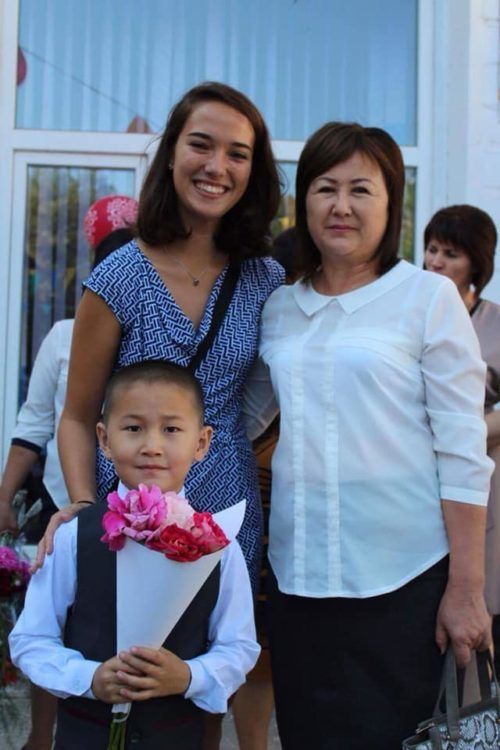Taking advantage of no commitments #IVLP

“You’ll never be fully prepared. The best is to just have an attitude that’s open to new experiences and being very flexible”. How volunteering and teaching English to speakers of other languages can spark interest in international development. Meet Colleen Adenan from Annandale

You are a project coordinator for the International Visitor Leadership Program. Can you tell us more about it?
The International Visitor Leadership Program is the State Department’s professional exchange program. It’s invitation-only, so participants can’t apply. Embassies around the world select individuals to come to the US, and usually it’s a three-week program where they travel around the US and have meetings with people in their field. It’s designed to not just have people come to the US and learn everything from us. It’s designed to be an exchange, so the people that they’re meeting with are also learning about the experience and their country. It is a great exchange of ideas, but also a great opportunity for people to visit the US, not just to see places like New York and Washington DC or Los Angeles. But they go to smaller cities and towns too, and they typically meet with families at their homes, so that’s really great.
How come you ended up doing this job?
I grew up in Annandale, Virginia which is like a suburb of Washington DC. The area of Northern Virginia is pretty wealthy because a lot of people work for the government. But the high school I went to was actually very diverse. We spoke about my Indonesian ancestry, which let me be more curious about the world. The thing that sparked my interest in international development was my teaching English to speakers of other languages. I volunteered in college and I really liked the experience. But for those who want to work in international development in the United States it’s hard to get internships or jobs because they require experience. But at the same time it’s like: “Well how do you get the experience if you can’t get the job to get the experience?” One way to get experience through the Peace Corps which is a volunteer program run by the United States Government providing international social and economic development assistance. So that was the main reason I joined it after college and went to Kyrgyzstan to teach English. I got a lot of skills from there, mainly the experience of living in a different and unfamiliar country and having to work with people who have different customs and values than the ones you grew up with. I’m also studying to get my Masters in International Development right now, and I combine it with my work at the IVLP.

What do you find most fascinating about your area of work?
When at the Peace Corps, I really enjoyed teaching students. But I was also training teachers to be better at their job. I really liked the idea of doing something meaningful. When I came back to the US 2 years ago, I saw this job post at the IVLP, and I was really interested. Because the exchange goes both ways – we also learn much from the people that visit the US. I really find the people that we met so fascinating. When they join the project or come to Washington DC first, and we have a meeting with them in our office, getting to talk to them is always the best part!
What is the most challenging thing in working with people from different countries/cultures?
I think the most challenging thing is definitely the difference in cross-culture communication. Sometimes it can lead to moments when you’re frustrated because something that may be offensive in your country may not be offensive in another. Whenever cross-culture communication doesn’t go well, it is the most difficult. Especially because it’s very hard to fix once it becomes a problem!

And the most rewarding?
It is when you find some sort of common values that you would never expect. Then you’re just thinking about it like “Wow I grew up in here, in America, and I’m meeting someone who’s on the other side of the world and we both really like this current TV show!” ;) I’m just thinking about how connected the world has become and how lucky we are to be living in it and be able to have an interview with someone in Poland right now – for example. It’s so interesting and cool, and I just feel very lucky when I’m able to have these interactions and opportunities.
If you were to pick the most valuable experience/lesson you have learned from your past professional experiences, what would it be?
In the Peace Corps – I went to Kyrgyzstan for 18 months – you do the 3 months training where you live with a host family in the village, and you learn how to be a teacher. You also learn how to speak their language. After these 3 months you go and live in a different place and there you’re on your own. I remember that when I got to the village where I was supposed to teach, I was suddenly alone with the counterpart that I was teaching with and with my new host family. Every day I would go to the school. Every day at that school there was something happening and I had no idea what was going on or why. There would be a holiday that I didn’t know about, classes would be canceled, things happened. So, I think the lesson I’ve learned, the most valuable one, is: you’ll never be fully prepared. The best is to just have an attitude that’s open to new experiences and being very flexible.
When did you decide upon this career path? What are you plans next?
I think I chose it towards the end of college. Have you ever heard of this American show called “Scandal?” It’s about a woman who works in Washington DC and works in public relations. She helps politicians fix their image after a scandal or when another one breaks out. So, when I started college, I watched the show, and I was like “I wanna work in PR!” ;) But then, as I started volunteering in teaching English, I was more interested in working in other countries or with people from other countries, helping them. In the future I would like to work for a government agency that works in other countries. The nice thing about international development is that it’s so diverse. There are so many things you could do with that – you could do education, public health or climate change. As a result, it’s really easy to change your mind based on whatever you’re interested in at the time.

These days are really unstable and often leave us with many questions like: what should I do in my life? Which way should I choose? Is there any advice you could give to the young generation?
I would say to keep in mind that looking at someone else’s accomplishments (especially on social media) doesn’t necessarily tell you about their experience or how they got there. Don’t sit there and think “Oh, I have to do two years at this job, and then I have to move to this organization.” Life happens just with whatever comes up at that moment. So, I think that you should just be really open to whatever opportunities come your way in terms of your career, and if you’re interested in something, you should learn about it (i.e. through volunteering) before you commit to changing your career path drastically. This is the time to take advantage of the fact that you don’t have any commitments. I think that will be my advice.
Colleen Adenan is a project coordinator of the International Visitor Leadership Program and an MA student in International Development at the prestigious Elliott School of International Affairs in Washington DC. Before, she used to be a Peace Corps volunteer, teaching English in Kyrgyzstan.
Photos: Courtesy of Colleen Adenan


